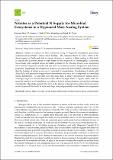Nitrates as a potential N Supply for microbial ecosystems in a hyperarid Mars analog system
Abstract
Nitrate is common in Mars sediments owing to long-term atmospheric photolysis, oxidation, and potentially, impact shock heating. The Atacama Desert in Chile, which is the driest region on Earth and rich in nitrate deposits, is used as a Mars analog in this study to explore the potential effects of high nitrate levels on growth of extremophilic ecosystems. Seven study sites sampled across an aridity gradient in the Atacama Desert were categorized into 3 clusters—hyperarid, middle, and arid sites—as defined by essential soil physical and chemical properties. Intriguingly, the distribution of nitrate concentrations in the shallow subsurface suggests that the buildup of nitrate is not solely controlled by precipitation. Correlations of nitrate with SiO2/Al2O3 and grain sizes suggest that sedimentation rates may also be important in controlling nitrate distribution. At arid sites receiving more than 10 mm/yr precipitation, rainfall shows a stronger impact on biomass than nitrate does. However, high nitrate to organic carbon ratios are generally beneficial to N assimilation, as evidenced both by soil geochemistry and enriched culturing experiments. This study suggests that even in the absence of precipitation, nitrate levels on a more recent, hyperarid Mars could be sufficiently high to benefit potentially extant Martian microorganisms.
Citation
Shen , J , Zerkle , A L , Stueeken , E E & Claire , M 2019 , ' Nitrates as a potential N Supply for microbial ecosystems in a hyperarid Mars analog system ' , Life , vol. 9 , no. 4 , 79 . https://doi.org/10.3390/life9040079
Publication
Life
Status
Peer reviewed
ISSN
2075-1729Type
Journal article
Description
This research was funded by European Research Council (ERC) under the European Union’s Horizon 2020 Research and Innovation Programme (Grant Agreement 678812) (to M.W.C.). J.S. also acknowledges support from the China Scholarship Council (CSC).Collections
Items in the St Andrews Research Repository are protected by copyright, with all rights reserved, unless otherwise indicated.

